- Home
- Paulo Coelho
Brida: A Novel Page 6
Brida: A Novel Read online
Page 6
Brida still didn't understand. The only way she had of describing her experience was through words.
"When you spoke of a woman," Wicca explained, "you were not that woman. You were part of her. Other people might well have the same memory as you."
Brida felt robbed. That woman had been so strong, and she didn't want to share her with anyone. Besides, there was Talbo, too.
"Talk to me about your Gift," Wicca said yet again. She couldn't allow the girl to be too dazzled by the experience. This form of time travel often brought problems.
"I have so many things to tell, and I need to talk to you, because no one else will believe me. Please," begged Brida.
She began to tell her everything, from the moment when the rain was dripping on her face. She had a chance and she couldn't waste it, the chance to be with someone who believed in the extraordinary. She knew that no one else would listen to her with the same respect, because people were afraid of discovering that life was magical. They were used to their houses, their jobs, their expectations, and if someone turned up saying that it was possible to travel in time, that it was possible to see castles adrift in the Universe, tarot cards that told stories, men who walked through the dark night, people who had never experienced such things would feel that life had cheated them. Life, as far as they were concerned, was the same every day, every night, every weekend.
That's why Brida needed to seize that chance. If words were God, then let it be recorded on the air around her that she had traveled back in time and that she remembered every detail as if it were now, as if it were the wood where they were right now. And so, when, later on, someone managed to prove to her that none of this had happened, when time and space made her doubt it all, when she herself was convinced that it had been mere illusion, the words spoken that evening, there in the wood, would still be vibrating in the air, and at least one person, someone for whom magic was part of life, would know that it had really happened.
She described the castle, the priests in the black and yellow robes, the valley filled with fires, the husband thinking thoughts that she could read without him speaking them. Wicca listened patiently, only showing any interest when she told her about the Voices that appeared in Loni's mind. Then she would interrupt and ask if the Voices were male or female (they were both), if they expressed any particular emotion, aggression, or sympathy (no, they were impersonal), and if she could summon up the Voices whenever she wished (she didn't know, she hadn't had time to find out).
"All right, we can leave now," said Wicca, taking off her cloak and putting it back in her bag. Brida was disappointed. She thought she might receive some words of praise, or, at the very least, some explanation. But Wicca resembled one of those doctors who study their patient very coolly and objectively, more interested in noting down symptoms than in understanding the pain and suffering caused by those symptoms.
They made the long journey back. Whenever Brida tried to raise the subject again, Wicca would show a sudden interest in the increase in the cost of living, in the rush-hour traffic jams, and the difficulties she was having with the manager of the building where she lived.
Only when they were once more sitting in the usual two armchairs did Wicca comment on Brida's experience.
"I just want to say one thing to you," she said. "Don't bother trying to explain your emotions. Live everything as intensely as you can and keep whatever you felt as a gift from God. If you think that you won't be able to stand a world in which living is more important than understanding, then give up magic now. The best way to destroy the bridge between the visible and the invisible is by trying to explain your emotions."
Emotions were like wild horses, and Brida knew that reason could never entirely master them. When a boyfriend once left her, giving no explanation, she had stayed at home for months, going over and over his many defects and the thousand and one things that had been wrong with their relationship. Yet she woke up every morning thinking about him and knowing that if he phoned her, she would probably agree to meet.
The dog in the kitchen barked. Brida knew this was a sign that her visit was over.
"Oh, please, we haven't even talked about what happened!" she cried. "And there are two questions I simply must ask."
Wicca stood up. The girl always found a way of leaving any important questions to the very last moment, just when it was time for her to leave.
"I want to know if the priests I saw really existed."
"We have extraordinary experiences, and less than two hours later, we're trying to convince ourselves that it was the mere product of our imagination," said Wicca, going over to the bookshelves. Brida remembered that when they were in the wood, she herself had been thinking about people who were afraid of the extraordinary. And she felt ashamed of herself.
Wicca returned, bearing a book.
"The Cathars, or the Perfect Ones, were the priests of a church founded in the south of France at the end of the twelfth century. They believed in reincarnation and in the existence of absolute Good and absolute Evil. The world was divided into the chosen and the lost, which meant that there was no point in trying to convert anyone.
"The Cathars' indifference to worldly values led many of the feudal lords in the Languedoc region to adopt their religion as a way of avoiding having to pay the heavy taxes imposed at the time by the Catholic Church. Equally, since it had been decided at birth who was good and who was bad, the Cathars were very tolerant in their attitude to sex and, in particular, in their attitude to women. They were only strict about such matters with those who had been ordained as priests.
"Everything was fine until Catharism started to spread. The Catholic Church felt threatened and called for a crusade against the heretics. For forty years, Cathars and Catholics fought bloody battles, but the legalist forces, with the support of various other nations, finally managed to destroy all the towns that had adopted the new religion. Only the fortress of Monsegur, in the Pyrenees, remained, and the Cathars besieged there held out until the French discovered the secret passageway through which they had been receiving supplies. One March morning in 1244, after the surrender of the castle, two hundred and twenty Cathars hurled themselves, singing, into the huge bonfire lit at the bottom of the mountain on which the castle had been built."
Wicca said all this with the book, still closed, on her lap. Only when she had finished her story did she open it and leaf through it, looking for a photograph.
Brida saw the ruined building, with the tower almost completely destroyed, but with the walls intact. There was the courtyard, the steps Loni and Talbo had climbed, the rock that formed part of the wall, and the tower.
"You said there was another question you wanted to ask me."
The question was of no importance now. Brida could hardly think straight. She felt odd. With some effort she managed to remember what it was she had wanted to ask.
"I want to know why you're wasting your time with me, why you want to teach me."
"Because that is what the Tradition is telling me to do," replied Wicca. "In your successive incarnations, you changed very little. You belong to the same group as people like myself and my friends. We are the ones charged with maintaining the Tradition of the Moon. You are a witch."
Brida paid no attention to what Wicca was saying. It didn't even occur to her to make another appointment to meet. All she wanted at that moment was to leave, to be among ordinary things that would bring her back to her familiar world--a damp stain on the wall, a packet of cigarettes discarded on the floor, some letters left on the porter's desk.
"I have to work tomorrow." She was suddenly concerned about the time.
On her way back home, she started pondering her company's invoicing system for exports and came up with a way of simplifying certain administrative procedures. She felt very pleased. Her boss might approve of what she was doing and, who knows, give her a raise.
She got home, had supper, and watched a bit of television. Then she wrote down her thou
ghts about invoicing on a piece of paper and fell, exhausted, into bed.
The invoicing of exports had taken on great importance in her life. That, after all, was what she was paid to do.
Nothing else existed. Everything else was a lie.
For a whole week, Brida woke promptly, worked hard at the office, and received due praise from her boss. She didn't miss one of her classes and took an interest in everything printed in all the magazines at the newsstand. All she needed was to avoid thinking. Whenever thoughts surfaced of her meeting with a Magus in the forest or with a witch in the city, she immediately drove them out by reminding herself that she had exams next week or by recalling a remark made by one female friend about another.
Friday came around, and her boyfriend met her outside the university to go to the cinema. Afterward, they went to their usual bar, talked about the film, their colleagues, and about their respective jobs. They bumped into friends who were on their way back from a party and decided to join them for supper, grateful that, in Dublin, you could always find a restaurant open.
At two o'clock in the morning, they said good-bye to their friends and decided to go back to her place. As soon as they got in, she put on a record by Iron Butterfly and poured them each a double whiskey. They lay on the sofa with their arms around each other, silent and abstracted, while he stroked her hair and her breasts.
"It's been a really crazy week," she said suddenly. "I worked nonstop, prepared for my exams, and did all the shopping."
The record finished. She got up to turn it over.
"You know the cupboard door in the kitchen, the one that had come unstuck? Well, I finally managed to arrange a date for someone to come and fix it. And I had to go to the bank several times as well, once to collect some money my dad sent me, and again to deposit some checks for the firm and then..."
Lorens was staring at her.
"Why are you staring at me?" she asked rather aggressively. Who was this man lying on the sofa, staring at her, incapable of saying anything of interest? It was quite absurd. She didn't need him. She didn't need anyone.
"Why are you staring at me?" she asked again.
But he said nothing. He merely stood up, went over to her, and very tenderly led her back to the sofa.
"You're not listening to anything I say," said Brida, confused.
Lorens put his arms around her.
"Emotions are like wild horses," she thought.
"Tell me everything," Lorens said sweetly. "I'll listen and respect whatever decision you make, even if you've met someone else, even if this is good-bye. We've been together for a while now. I may not know you that well; I mean, I don't know exactly who you are, but I know who you're not. And you haven't been yourself all night."
Brida felt like crying, but she'd shed so many tears already over dark nights, talking tarot cards and enchanted forests. Emotions really were like wild horses, and all she could do now was set them free.
She sat down in front of him, remembering that the Magus and Wicca both favored that position. Then she gave him a complete account of everything that had happened since her meeting with the Magus in the forest. Lorens listened in total silence. When she told him about the photograph of Monsegur, Lorens asked if she had perhaps heard about the Cathars in one of her university courses.
"Look, I know you don't believe a word of what I've told you," she retorted. "You think it was my unconscious mind, that I just remembered things I already knew, but no, Lorens, I had never heard of the Cathars before. But you, of course, have an explanation for everything."
Her hands were shaking uncontrollably. Lorens got to his feet, picked up a piece of paper, and made two holes in it, about eight inches apart. He placed the sheet of paper on the table, leaning it against the whiskey bottle, so that it was vertical.
Then he went into the kitchen and returned bearing a cork.
He sat at the head of the table, pushed the piece of paper and the bottle to the other end, and put the cork in front of him.
"Come over here," he said.
Brida got up. She was trying to hide her shaking hands, not that he appeared to notice.
"Let's pretend that this cork is an electron, one of the small particles that make up the atom. Do you understand?"
She nodded.
"Right, well listen carefully. If I had certain highly complicated bits of apparatus with me that would allow me to shoot an electron in the direction of that piece of paper, it would pass through the two holes at the same time, except that it would do so without splitting into two."
"I don't believe it," she said. "That's impossible."
Lorens took the piece of paper and threw it away. Then, being a tidy person, he put the cork back where it belonged.
"You may not believe it, but it's true. It's something that scientists know but can't explain. I don't believe a thing you've told me, but I know that it's true."
Brida's hands were still shaking, but she wasn't crying and she didn't lose control. All she noticed was that the effect of the alcohol had completely worn off. She was strangely lucid.
"And what do scientists do when confronted by these mysteries?"
"They enter the Dark Night, to use a term you taught me. We know that the mystery won't ever go away and so we learn to accept it, to live with it. I think the same thing happens in many situations in life. A mother bringing up a child must feel that she's plunging into the Dark Night, too. Or an immigrant who travels to a far-off country in search of work and money. They believe that their efforts will be rewarded and that one day they'll understand what happened along the way that, at the time, seemed so very frightening. It isn't explanations that carry us forward, it's our desire to go on."
Brida suddenly felt immensely tired. She needed to sleep. Sleep was the only magical kingdom into which she could freely enter.
That night, she had a beautiful dream full of seas and leafy islands. She woke in the early hours and was glad that Lorens was there beside her. She got up and went over to the bedroom window, where she looked out over the sleeping city of Dublin.
She thought of her father, who used to do just that with her whenever she woke feeling frightened. The memory brought with it another scene from her childhood.
She was on the beach with her father, and he asked her to go and see what the temperature of the water was like. She was five years old and glad to be able to help. She went to the water's edge and dipped in a toe.
"I put my feet in and it's cold," she told him.
Her father picked her up and carried her down to the water again and, without any warning, threw her in. She was shocked at first, but then laughed out loud at the trick he'd played.
"How's the water?" asked her father.
"It's lovely," she replied.
"Right, from now on, whenever you want to find out about something, plunge straight in."
She had quickly forgotten this lesson. She may only have been twenty-one, but she had already nurtured many enthusiasms, which she had abandoned as quickly as she had taken them up. She wasn't afraid of difficulties; what frightened her was being forced to choose one particular path.
Choosing a path meant having to miss out on others. She had a whole life to live, and she was always thinking that, in the future, she might regret the choices she made now.
"I'm afraid of committing myself," she thought to herself. She wanted to follow all possible paths and so ended up following none.
Even in that most important area of her life, love, she had failed to commit herself. After her first romantic disappointment, she had never again given herself entirely. She feared pain, loss, and separation. These things were inevitable on the path to love, and the only way of avoiding them was by deciding not to take that path at all. In order not to suffer, you had to renounce love. It was like putting out your own eyes in order not to see the bad things in life.
"Life is so complicated."
You had to take risks, follow some paths and abandon others. Sh
e remembered Wicca telling her about people who followed certain paths only to prove that they weren't the right ones, but that wasn't as bad as choosing a path and then spending the rest of your life wondering if you'd made the right choice. No one could make a choice without feeling afraid.
That was the law of life. That was the Dark Night, and no one could escape the Dark Night, even if they never made a decision, even if they lacked the courage to change anything, because that in itself was a decision, a change, except without the benefit of the treasures hidden in the Dark Night.
Lorens might be right. In the end, they would laugh at their initial fears, just as she had laughed at the snakes and scorpions she had imagined were there in the forest. In her despair, she had forgotten that Ireland's patron saint, St. Patrick, had long ago driven out all the snakes.
"I'm so glad you exist, Lorens," she said softly, afraid that he might hear.
She went back to bed and soon fell asleep. Before she did, though, she remembered another story about her father. It was Sunday, and they and all the family were having lunch at her grandmother's house. She must have been about fourteen, and she was complaining about not being able to do a homework assignment, because every time she started, it went wrong.
"Perhaps the times when it goes wrong are teaching you something," said her father. But Brida was sure that she'd taken the wrong path and that there was no way to put things right.
Her father took her by the hand and led her into the living room, where her grandmother used to watch television. There was a large, antique grandfather clock, which had stopped years before because it could no longer be repaired.
"Nothing in the world is ever completely wrong, my dear," said her father, looking at the clock. "Even a stopped clock is right twice a day."
She walked for some time in the wooded mountains before she found the Magus. He was sitting on a rock, near the top of the mountain, contemplating the valley and the mountains to the west. It was a really beautiful view, and Brida recalled that spirits preferred such places.

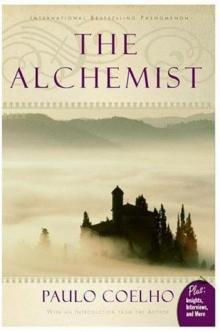 The Alchemist
The Alchemist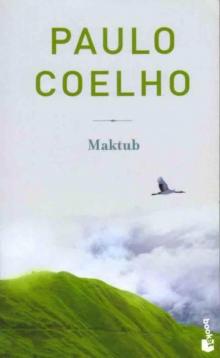 Maktub
Maktub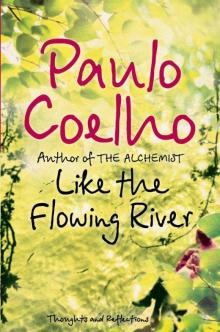 Like the Flowing River
Like the Flowing River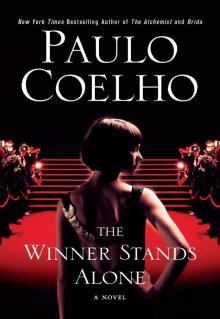 The Winner Stands Alone
The Winner Stands Alone The Spy
The Spy By the River Piedra I Sat Down and Wept: A Novel of Forgiveness
By the River Piedra I Sat Down and Wept: A Novel of Forgiveness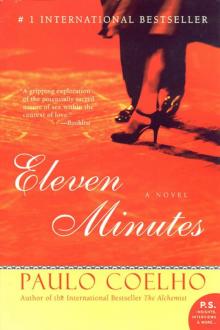 Eleven Minutes
Eleven Minutes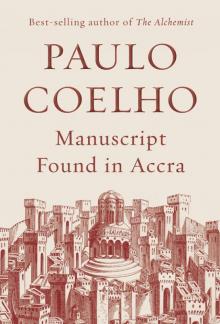 Manuscript Found in Accra
Manuscript Found in Accra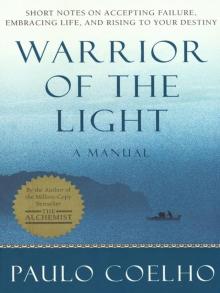 Warrior of the Light
Warrior of the Light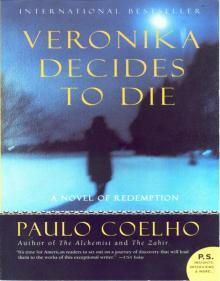 Veronika Decides to Die: A Novel of Redemption
Veronika Decides to Die: A Novel of Redemption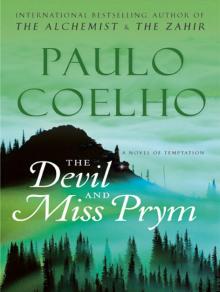 The Devil and Miss Prym: A Novel of Temptation
The Devil and Miss Prym: A Novel of Temptation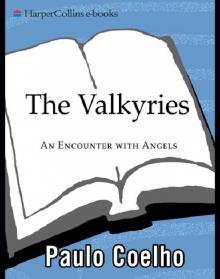 The Valkyries: An Encounter With Angels
The Valkyries: An Encounter With Angels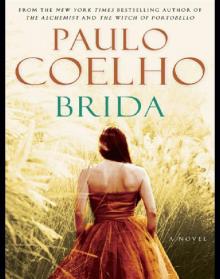 Brida: A Novel
Brida: A Novel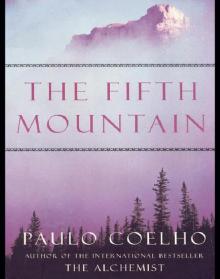 Fifth Mountain: A Novel
Fifth Mountain: A Novel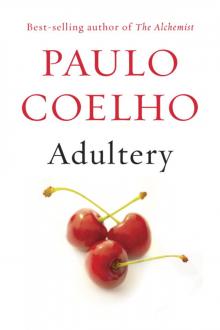 Adultery
Adultery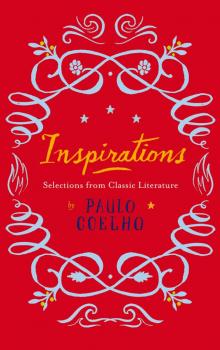 Inspirations
Inspirations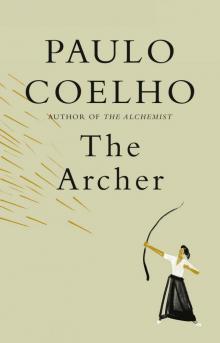 The Archer
The Archer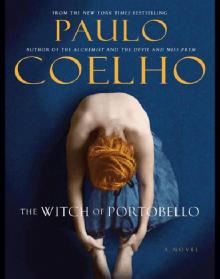 The Witch of Portobello
The Witch of Portobello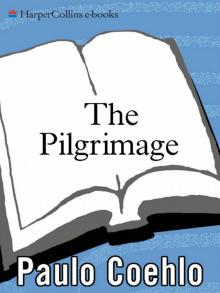 The Pilgrimage
The Pilgrimage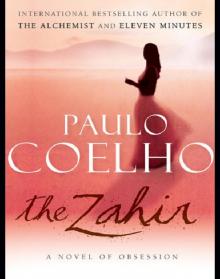 The Zahir
The Zahir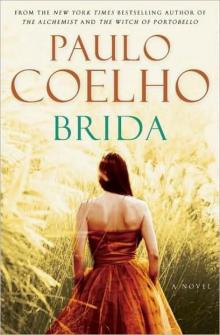 Brida
Brida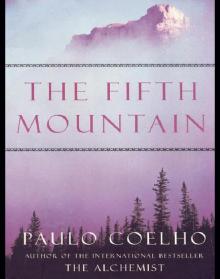 The Fifth Mountain
The Fifth Mountain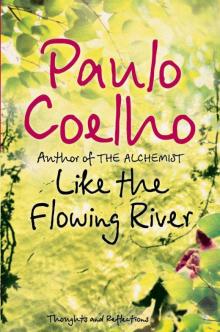 Like the Flowing River: Thoughts and Reflections
Like the Flowing River: Thoughts and Reflections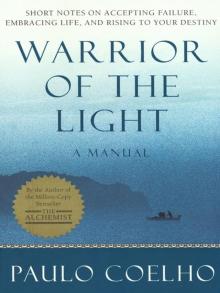 Manual of the Warrior of Light
Manual of the Warrior of Light By The River Piedra I Sat Down & Wept
By The River Piedra I Sat Down & Wept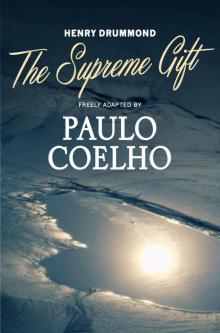 The Supreme Gift
The Supreme Gift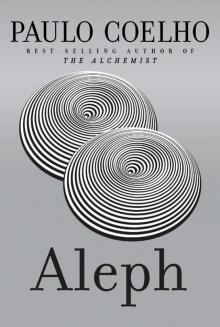 Aleph
Aleph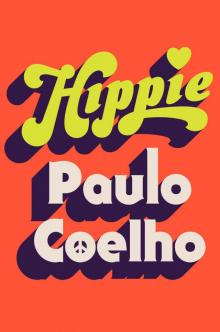 Hippie
Hippie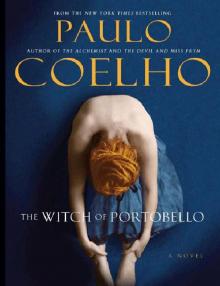 Witch of Portobello
Witch of Portobello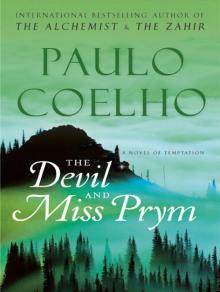 The Devil and Miss Prym
The Devil and Miss Prym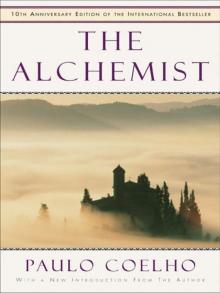 The Alchemist - 10th Anniversary Edition
The Alchemist - 10th Anniversary Edition The Valkyries
The Valkyries